Natural Resources of Uzbekistan: An In-Depth Exploration
November 15, 2024
Uzbekistan is rich in mineral resources, making it one of Central Asia's most resourceful nations. It is especially well-known for its enormous gold deposits, which are exemplified by the Muruntau Gold Mine, one of the biggest open-pit mines in the world. The nation also produces a lot of natural gas, which is essential to its economy and energy security. Although the country is modernizing and focusing on sustainable practices, its natural wealth is still vital for economic growth and has bright future opportunities.
This article explores the major natural resources of Uzbekistan, their extraction, usage, and economic implications.
From Gold to Gas: Exploring Uzbekistan's Wealth of Mineral Resources
1. Vast Deposits of Natural Gas
Uzbekistan is one of the largest producers and exporters of natural gas in Central Asia, leveraging its vast Uzbekistan mineral resources to strengthen its position as an energy supplier. The country holds approximately 1.6 trillion cubic meters of proven reserves, making it a key player in the region’s energy market.
Natural gas production is primarily concentrated in the Amu Darya Basin and the Fergana Valley, with major facilities such as the Shurtan Gas Chemical Complex and the Mubarek Gas Processing Plant playing a central role in the extraction and processing of these resources.
In addition, the natural gas industry not only supplies fuel to the domestic market but also supplies energy to neighboring countries such as Kazakhstan, Tajikistan, and even Russia.
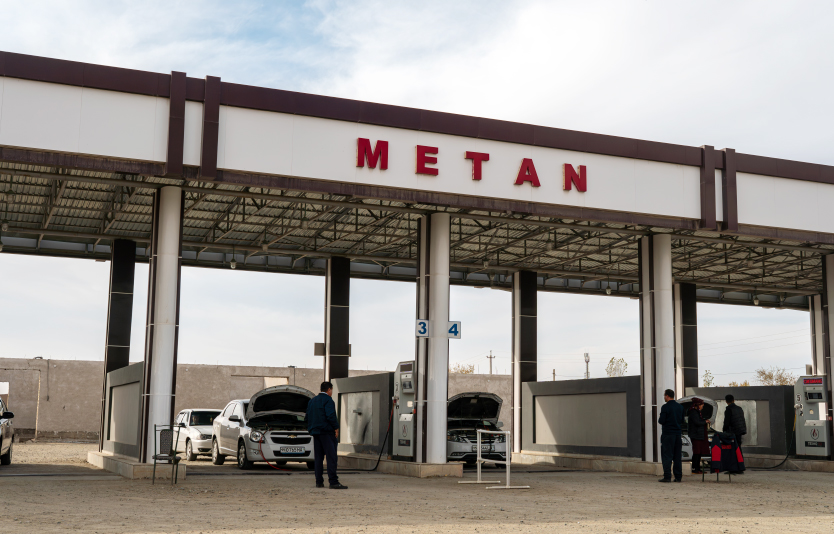
Uzbekistan is one of the largest producers and exporters of natural gas in Central Asia
2. Rich Reserves of Gold
Uzbekistan ranks as one of the top gold-producing countries globally, largely due to the rich deposits of Uzbekistan minerals like gold at the Muruntau Gold Mine, one of the world’s largest open-pit gold mines.
The Muruntau Mine, located in the Kyzylkum Desert, has been operating for decades and contributes significantly to the country’s gold output. Gold mining accounts for about 20% of Uzbekistan’s GDP and serves as a major export. State-owned Navoi Mining and Metallurgical Combinat (NMMC) operates most of the country’s gold mines, playing a vital role in managing Uzbekistan’s mineral wealth.
Uzbekistan is currently modernizing and expanding its mining infrastructure to increase production capacity, a move that is expected to solidify the country’s position as a major player in the global gold market.
3. Abundant Cotton Cultivation and Agriculture
Though not a "mineral" resource, cotton is often referred to as "white gold" in Uzbekistan. It’s one of the largest producers and exporters of cotton in the world, supplying high-quality fiber to countries worldwide. Cotton cultivation spans across the Fergana Valley, Karakalpakstan, and Syr Darya regions.
Cotton yields have been greatly increased by the nation's dedication to water management and irrigation technology developments. Uzbekistan is a significant producer of fruits and vegetables, such as melons, grapes, and cherries, in addition to cotton.
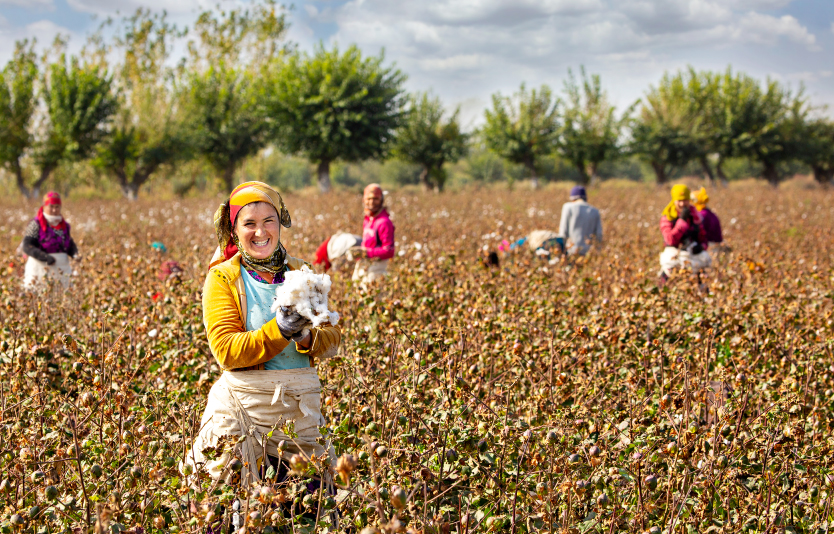
Uzbek farmers in the cotton field harvest cotton
4. Uranium Reserves: A Strategic Asset
Uzbekistan has significant uranium reserves, which are a key part of Uzbekistan minerals and contribute to its status as a major uranium producer. The country stands among the top ten uranium-producing nations globally. Most of Uzbekistan’s uranium extraction is carried out through in-situ leaching (ISL), an eco-friendly and efficient mining technique that allows for minimal environmental impact while maximizing output.
The Navoi Mining and Metallurgical Combinat is also responsible for uranium mining, alongside its gold mining operations. The country's uranium is primarily exported to countries with significant nuclear power programs, such as Japan, South Korea, and the United States.
5. Water Resources: Lifeblood of Agriculture
In Uzbekistan, water is a vital natural resource that sustains the country's extensive agricultural industry and is a crucial component of its Uzbekistan mineral resources. The Amu Darya and the Syr Darya are two significant rivers essential to the nation’s irrigation system. These rivers supply the water required to cultivate crops like cotton, wheat, and various fruits, supporting a large portion of Uzbekistan's agricultural territory.
To tackle issues like salinity and water scarcity, Uzbekistan has made significant investments in updating irrigation methods and enhancing water management. Given the nation's reliance on agriculture, the government continues to place a high premium on efficient water use.
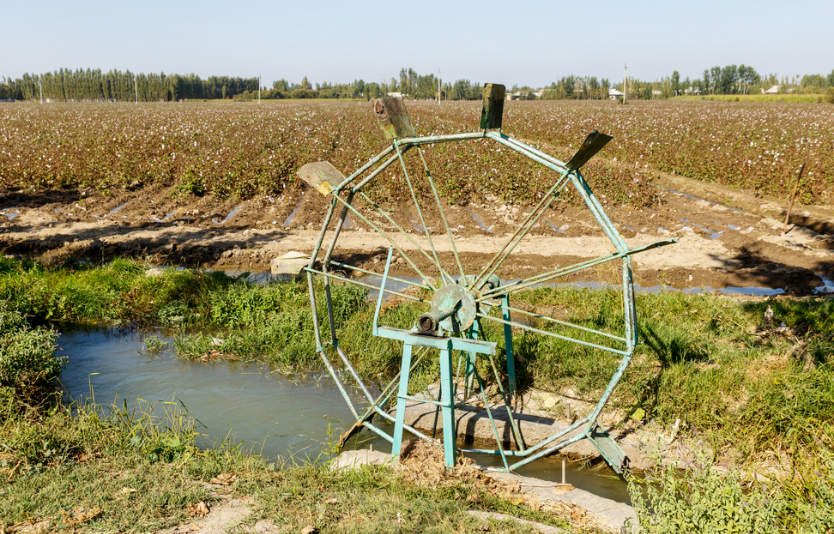
Water turbine on a cotton field
6. Coal and Mineral Wealth
Uzbekistan has significant uranium reserves, which have contributed to its status as a major uranium producer, thanks in part to its rich Uzbekistan mineral resources. The nation ranks among the top 10 producers of uranium worldwide. An effective and ecologically friendly mining method, in-situ leaching (ISL), accounts for the majority of uranium mining in Uzbekistan.
Additionally, Navoi Mining and Metallurgical Combinat is responsible for uranium mining, alongside its gold mining operations. The country’s uranium is primarily exported to nations with substantial nuclear power programs, such as Japan, South Korea, and the United States.
7. Silk and the Sericulture Industry
Uzbekistan’s silk production is another essential resource that shapes the country’s economic and cultural identity. Large mulberry plantations and sericulture farms are used to produce the country’s famous high-quality silk. Both modern silk items and traditional hand-woven Ikat fabrics are highly prized exports.
Silk production also enhances local tourism, attracting visitors interested in witnessing intricate silk-weaving techniques practiced for centuries in cities like Margilan.
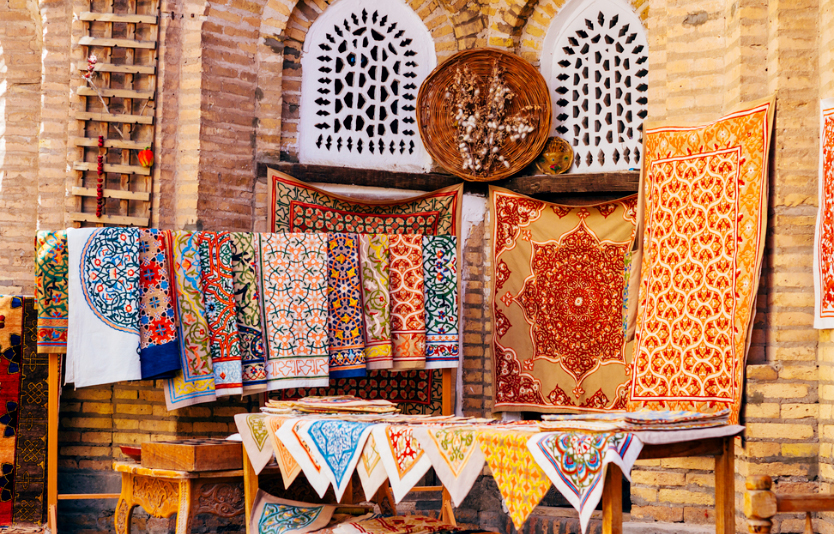
Uzbekistan’s silk production is a vital resource that shapes its economic and cultural identity
8. Potential in Renewable Energy
Uzbekistan’s vast expanses of desert and steppes offer tremendous potential for renewable energy, particularly solar and wind power. The government has launched initiatives to attract investment in renewable energy projects, aiming to diversify the country’s energy mix and reduce reliance on fossil fuels.
The Navoi Solar Plant is a notable project in the country’s renewable energy portfolio. By capitalizing on its sunny climate, Uzbekistan is making strides toward establishing itself as a regional leader in clean energy.
How Uzbekistan’s Natural Mineral Resources Shape Its Economy and Future Prospects
The exploitation of natural resources plays a vital role in Uzbekistan's economy.
- Contribution to GDP: The mining sector contributes significantly to GDP through exports of minerals like gold and copper. In recent years, natural gas exports have also become increasingly important.
- Employment: Approximately 28% of the labor force is employed in agriculture, which relies heavily on natural resources. The mining sector also provides jobs but requires skilled labor.
- Foreign Investment: Uzbekistan's government encourages foreign investment in resource extraction sectors to modernize technology and increase production efficiency. Joint ventures have been established with international companies to enhance mineral extraction processes.
Uzbekistan's future economic growth will depend on the sustainable management of its natural resources.
- Diversification: Efforts are underway to diversify the economy beyond traditional sectors like cotton production. Investments in renewable energy sources are being explored as part of a broader strategy to reduce reliance on fossil fuels.
- Sustainable Practices: Implementing sustainable practices in agriculture and mining can mitigate environmental impacts while ensuring long-term resource availability. Water management strategies must be prioritized to address ongoing scarcity issues.
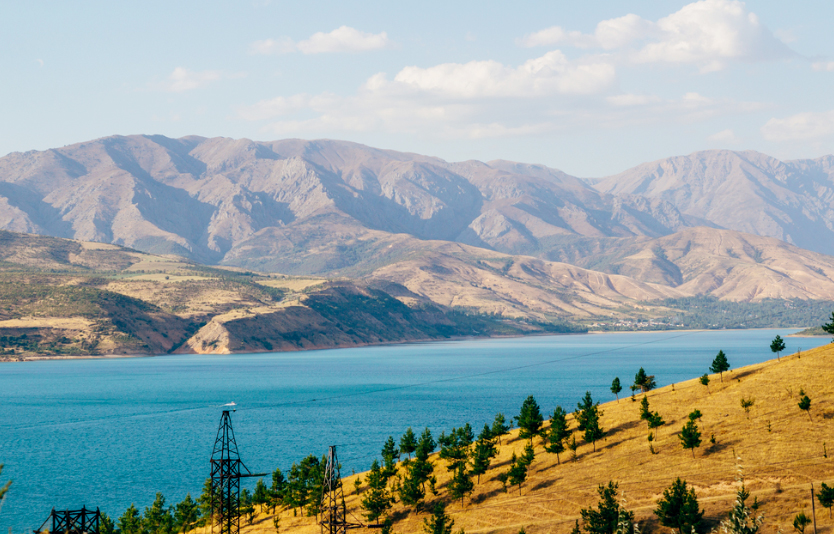
Uzbekistan will continue to be a key player in Central Asia’s economy
Uzbekistan’s diverse and plentiful natural resources have shaped its past and continue to influence its future. From gold and natural gas to fertile land for agriculture, the country's natural wealth is a cornerstone of its economy. Moreover, with continued modernization efforts and a growing emphasis on sustainability, Uzbekistan is set to remain an essential player in Central Asia’s economic landscape.
If you're curious about Uzbekistan's economy or planning a visit, be sure to consider applying for a Uzbekistan visa, as its resource-rich landscape is sure to leave a lasting impression!
Related Articles:
- Geography Of Uzbekistan: Discover A Land Of Contrasts And Beauty
- The Ultimate Uzbekistan Travel Guide: What Travelers Need To Know
- Where Is Uzbekistan: Travel Guide To Central Asia's Hidden Gem
- Plan Your Perfect Holidays To Uzbekistan: A Complete Guide
- Uzbekistan Places To Visit For A Stunning Vacation
- Cities To Visit In Uzbekistan: Exploring The Best Destinations
Tags




